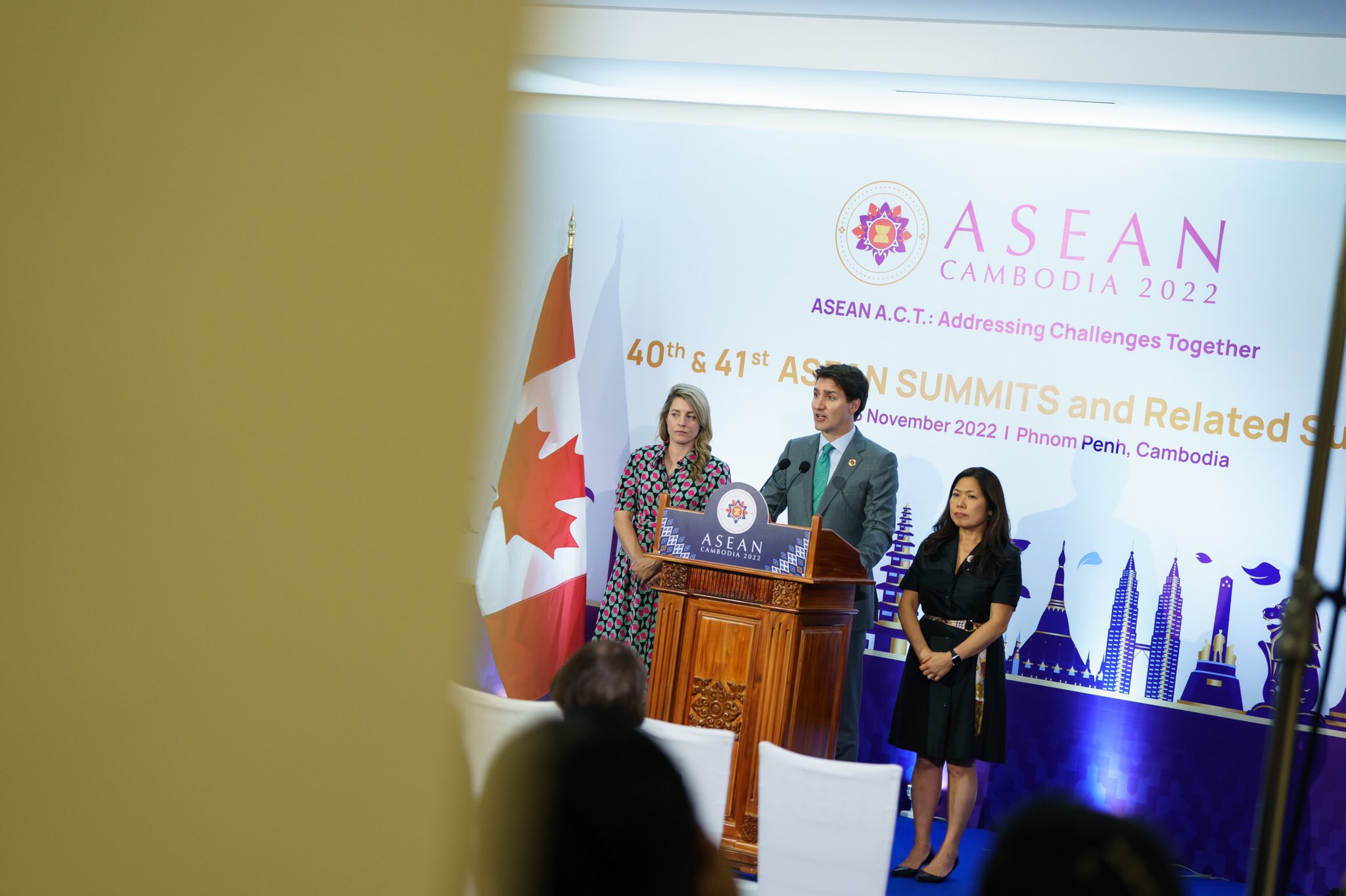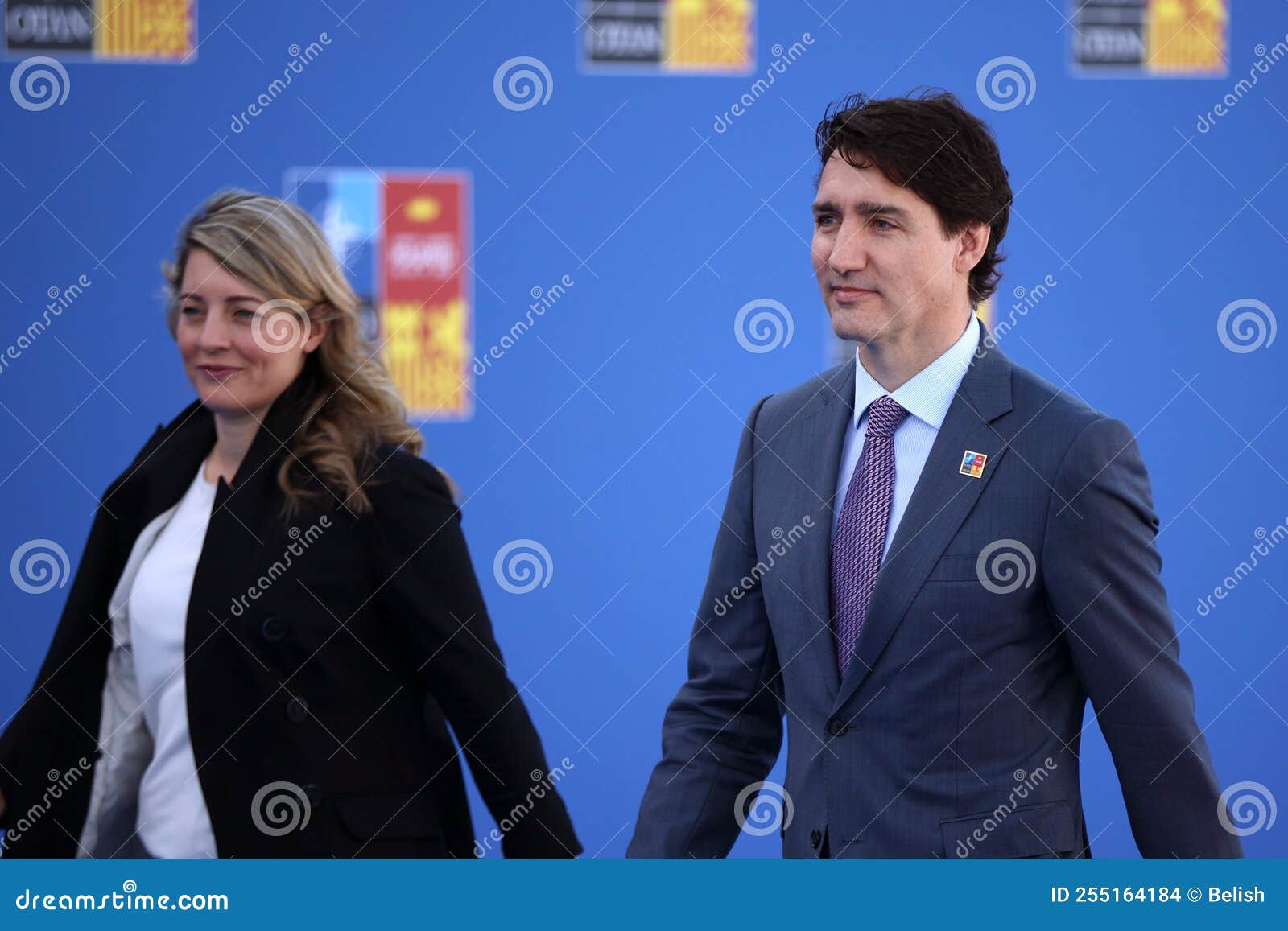Table of Contents
Introduction
The relationship between Mélanie Joly and Justin Trudeau has been a topic of interest among political analysts and the Canadian public. Both prominent figures in Canadian politics, their professional interactions and shared vision for the country have shaped key policies and initiatives. Mélanie Joly, a rising star in the Liberal Party, and Justin Trudeau, the Prime Minister of Canada, have collaborated on numerous projects that reflect their commitment to progressive governance. Their partnership is not just a matter of political convenience but a testament to their shared values and dedication to public service.
Mélanie Joly, known for her dynamic leadership and innovative ideas, has played a crucial role in Trudeau's cabinet. Her contributions to cultural and economic policies have been instrumental in advancing Canada's global standing. As a trusted ally, Joly has worked closely with Trudeau to address some of the nation's most pressing issues, from climate change to social equity. Their professional relationship is a reflection of their shared commitment to building a more inclusive and prosperous Canada.
This article delves into the professional and political relationship between Mélanie Joly and Justin Trudeau. By exploring their biographies, shared policies, and public perception, we aim to provide a comprehensive understanding of their collaboration. Whether you are a political enthusiast or simply curious about Canadian politics, this article will shed light on the dynamic partnership between these two influential leaders.
Read also:Unblocked Games 66 Ultimate Guide To Enjoy Gaming Anytime Anywhere
Biography of Mélanie Joly
Mélanie Joly is a prominent Canadian politician and a key figure in the Liberal Party of Canada. Born on June 27, 1979, in Montreal, Quebec, Joly has made significant contributions to Canadian politics through her leadership and innovative policies. Her career trajectory reflects her dedication to public service and her ability to navigate complex political landscapes.
| Full Name | Mélanie Joly |
|---|---|
| Date of Birth | June 27, 1979 |
| Place of Birth | Montreal, Quebec, Canada |
| Political Affiliation | Liberal Party of Canada |
| Current Position | Minister of Foreign Affairs |
| Education | University of Montreal, HEC Montreal |
Joly began her political career as a city councillor in Montreal before being elected to the House of Commons in 2015. Her rise within the Liberal Party has been marked by her ability to connect with diverse communities and her commitment to progressive policies. As Minister of Foreign Affairs, Joly has played a pivotal role in shaping Canada's international relations and promoting global cooperation.
Biography of Justin Trudeau
Justin Trudeau, the 23rd Prime Minister of Canada, was born on December 25, 1971, in Ottawa, Ontario. As the son of former Prime Minister Pierre Trudeau, Justin Trudeau grew up in the public eye and has since carved out his own legacy as a leader committed to social justice and inclusivity.
| Full Name | Justin Pierre James Trudeau |
|---|---|
| Date of Birth | December 25, 1971 |
| Place of Birth | Ottawa, Ontario, Canada |
| Political Affiliation | Liberal Party of Canada |
| Current Position | Prime Minister of Canada |
| Education | McGill University, University of British Columbia |
Trudeau's political career took off when he was elected as the leader of the Liberal Party in 2013. Under his leadership, the party regained its footing and won a majority government in 2015. Known for his progressive policies and emphasis on multiculturalism, Trudeau has worked tirelessly to position Canada as a leader on the global stage. His leadership style emphasizes collaboration and inclusivity, values that align closely with those of Mélanie Joly.
Professional Relationship Between Mélanie Joly and Justin Trudeau
The professional relationship between Mélanie Joly and Justin Trudeau is rooted in their shared commitment to progressive governance and public service. Both leaders have demonstrated a strong ability to collaborate effectively, leveraging their respective strengths to address complex challenges facing Canada.
As a trusted member of Trudeau's cabinet, Mélanie Joly has been instrumental in advancing key initiatives. Her expertise in cultural and economic policies complements Trudeau's broader vision for Canada. Together, they have worked on projects aimed at fostering innovation, promoting diversity, and addressing climate change. Their partnership is characterized by open communication and mutual respect, qualities that are essential for effective governance.
Read also:Connor Cruise A Rising Star In The Entertainment Industry
Shared Leadership Style
- Collaborative Approach: Both Joly and Trudeau prioritize collaboration and inclusivity in decision-making processes.
- Focus on Innovation: They share a commitment to fostering innovation and supporting Canada's creative industries.
- Emphasis on Equity: Their policies often emphasize social equity and the importance of addressing systemic inequalities.
Their professional relationship extends beyond cabinet meetings and policy discussions. Joly and Trudeau frequently engage with stakeholders, community leaders, and international partners to advance shared goals. This collaborative approach has strengthened their ability to deliver meaningful results for Canadians.
Key Political Collaborations
Mélanie Joly and Justin Trudeau have collaborated on numerous initiatives that reflect their shared vision for Canada. These collaborations have not only addressed immediate challenges but have also laid the groundwork for long-term progress.
Cultural and Economic Policies
One of the most notable collaborations between Joly and Trudeau has been in the realm of cultural and economic policies. As Minister of Foreign Affairs, Joly has worked closely with Trudeau to promote Canada's cultural industries on the global stage. Their efforts have included:
- Support for Creative Industries: Initiatives to support Canada's film, music, and digital media sectors.
- Trade Agreements: Negotiating trade agreements that benefit Canadian businesses and cultural exports.
- International Partnerships: Strengthening ties with international partners to foster cultural exchange and economic growth.
Climate Change and Environmental Policies
Addressing climate change has been a top priority for both Joly and Trudeau. Their collaboration in this area has focused on:
- Climate Action Plans: Developing comprehensive strategies to reduce greenhouse gas emissions and transition to a green economy.
- International Commitments: Upholding Canada's commitments to international climate agreements, such as the Paris Agreement.
- Community Engagement: Working with Indigenous communities and local stakeholders to implement sustainable practices.
These collaborations underscore their commitment to addressing pressing global issues while advancing Canada's interests on the world stage.
Shared Policies and Vision
The shared policies and vision of Mélanie Joly and Justin Trudeau reflect their dedication to building a more inclusive, innovative, and sustainable Canada. Their alignment on key issues has enabled them to implement policies that resonate with Canadians and address the challenges of the 21st century.
Promoting Diversity and Inclusion
Both Joly and Trudeau are strong advocates for diversity and inclusion. Their policies aim to create a society where everyone has the opportunity to succeed, regardless of background. Key initiatives include:
- Gender Equality: Promoting gender equality in all aspects of Canadian society, from the workplace to political representation.
- Immigration Reforms: Streamlining immigration processes to welcome skilled workers and refugees, while ensuring integration and support.
- Indigenous Reconciliation: Advancing reconciliation efforts with Indigenous communities through meaningful dialogue and policy changes.
Fostering Innovation and Economic Growth
Innovation is a cornerstone of Joly and Trudeau's shared vision for Canada. They have implemented policies to support economic growth and technological advancement, including:
- Investment in Research: Providing funding for research and development to drive innovation across industries.
- Support for Startups: Creating programs to support startups and small businesses, particularly in the tech sector.
- Digital Transformation: Promoting digital literacy and infrastructure to ensure Canada remains competitive in the global economy.
These policies reflect their commitment to positioning Canada as a leader in innovation and inclusivity.
Public Perception of Their Relationship
The public perception of the relationship between Mélanie Joly and Justin Trudeau is generally positive, with both leaders being viewed as effective collaborators who share a commitment to progressive governance. Canadians appreciate their ability to work together on complex issues and deliver tangible results.
Media coverage often highlights their professional synergy and shared values. For instance, their joint appearances at international summits and domestic events have reinforced the perception of a strong partnership. Public opinion polls frequently reflect approval for their collaborative approach, particularly on issues like climate change and cultural promotion.
Media and Public Sentiment
- Positive Media Coverage: Their partnership is often praised in the media for its focus on inclusivity and innovation.
- Public Approval: Polls indicate strong public support for their joint initiatives, particularly among younger Canadians.
- Criticism and Challenges: While generally well-received, their relationship has faced scrutiny during periods of political controversy.
Despite occasional criticism, the public largely views their collaboration as a positive force in Canadian politics.
Challenges and Controversies
Like any political partnership, the relationship between Mélanie Joly and Justin Trudeau has faced its share of challenges and controversies. While their collaboration has been largely successful, certain issues have tested their ability to navigate complex political landscapes.
Political Challenges
One of the primary challenges has been managing public expectations amid shifting political dynamics. For instance:
- Policy Criticism: Certain policies, such as climate action plans, have faced opposition from political rivals and industry stakeholders.
- Global Pressures: Navigating international relations, particularly during geopolitical tensions, has required careful diplomacy.
- Public Scrutiny: High-profile decisions, such as trade agreements, have drawn scrutiny from media and advocacy groups.
Controversies
Controversies have occasionally arisen, particularly during periods of political instability. For example:
- Allegations of Partisanship: Critics have accused their initiatives of favoring certain groups over others.
- Communication Gaps: Miscommunication during crises has sometimes led to public confusion.
- Internal Party Dynamics: Balancing diverse opinions within the Liberal Party has required strategic leadership.
Despite these challenges, Joly and Trudeau have demonstrated resilience and a commitment to addressing issues head-on.
Impact on Canadian

